Mediterranean Diet for Beginners: Your Ultimate Guide to Healthier Living
If you’ve been searching for a realistic, delicious, and sustainable way to eat healthier, the Mediterranean diet might just be the answer. In this comprehensive beginner’s guide, we’ll walk you through everything you need to know, what it is, how to start, what foods to eat, meal planning tips, lifestyle changes, long-term benefits, and even the best products to support your journey. Whether your goal is to lose weight, feel more energetic, improve your long-term health, or simply embrace a better way of living, this article has got you covered.
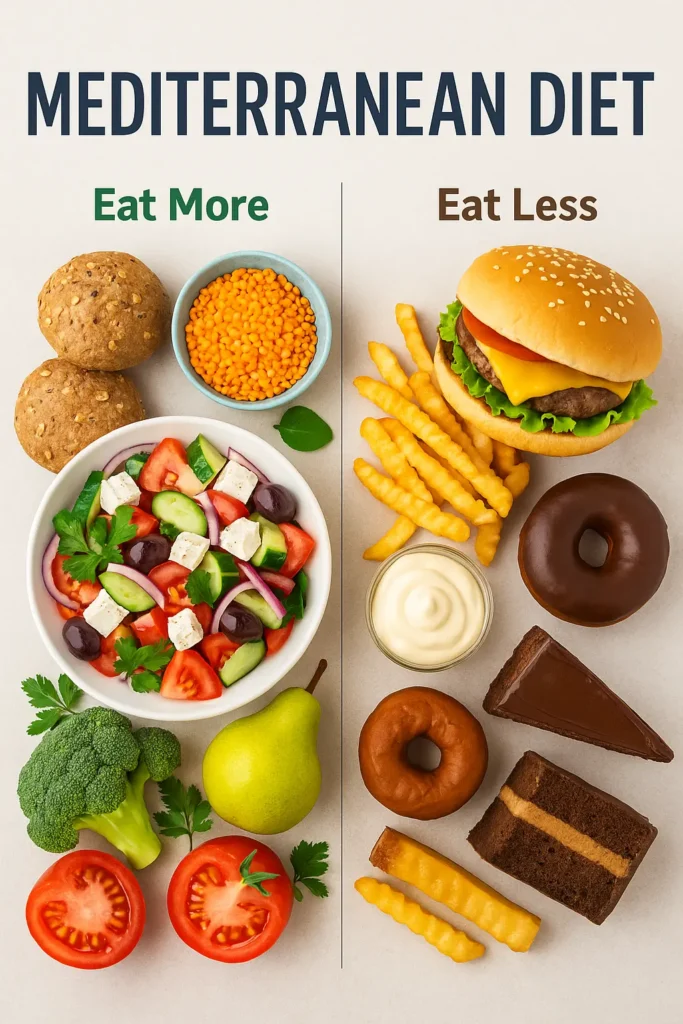
What is the Mediterranean Diet?
The Mediterranean diet isn’t a strict meal plan or the latest trendy fad. It’s a way of eating inspired by the traditional cuisines and cultures of countries bordering the Mediterranean Sea, like Greece, Italy, France, and Spain. This eating style is rich in plant-based foods, healthy fats, lean proteins, and fresh, seasonal ingredients.
Key Features:
- High intake of fresh fruits, vegetables, legumes, and whole grains
- Primary source of fat: healthy fats such as extra virgin olive oil
- Moderate amounts of fish, seafood, eggs, and poultry
- Low intake of red meat, sugar, and heavily processed foods
- Meals often enjoyed with family, slowly and socially
- Optional: red wine in moderation with meals
What sets the Mediterranean diet apart is that it’s more than just food. It’s about a holistic, healthy lifestyle, including physical activity, restful sleep, and time with loved ones.
Why Is It So Popular?
The Mediterranean diet consistently tops the list of the world’s healthiest diets. Year after year, it’s ranked #1 by health experts and dietitians and for good reason. Numerous studies have linked this diet to an array of health benefits:
- Cardiovascular health: Lower blood pressure and reduced risk of heart disease
- Brain health: Improved cognitive function and reduced risk of Alzheimer’s and dementia
- Weight control: A balanced, satiating way of eating that supports weight loss and maintenance
- Diabetes prevention: Improved blood sugar regulation and insulin sensitivity
- Longevity: People in Mediterranean regions often live longer, healthier lives
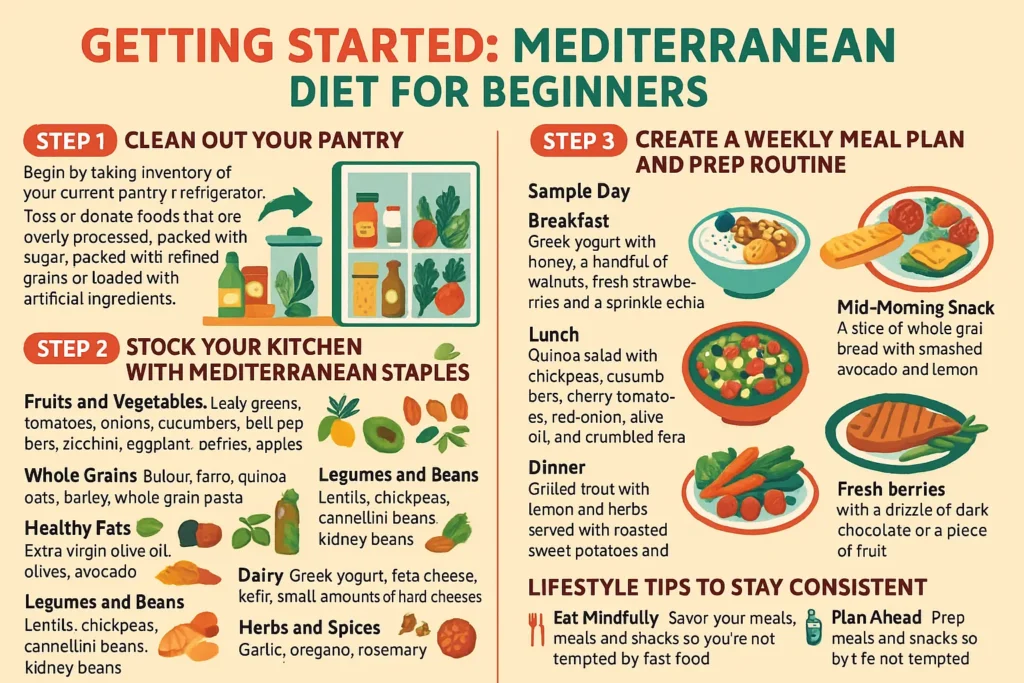
Getting Started: Mediterranean Diet for Beginners
Step 1: Clean Out Your Pantry
Begin by taking inventory of your current pantry and refrigerator. Toss or donate foods that are overly processed, packed with sugar, made with refined grains, or loaded with artificial ingredients. Replace them with fresh, wholesome ingredients that form the foundation of Mediterranean-style cooking.
Step 2: Stock Your Kitchen With Mediterranean Staples
To follow the Mediterranean diet effectively, keep these ingredients on hand:
- Fruits and Vegetables: Leafy greens (kale, spinach), tomatoes, onions, cucumbers, bell peppers, zucchini, eggplant, berries, apples, citrus fruits
- Whole Grains: Bulgur, farro, quinoa, oats, barley, whole grain pasta, brown rice
- Healthy Fats: Extra virgin olive oil, olives, avocado, nuts (walnuts, almonds, pistachios), seeds (chia, flaxseed)
- Legumes and Beans: Lentils, chickpeas, cannellini beans, kidney beans
- Lean Proteins: Salmon, sardines, trout, mackerel, chicken, turkey, eggs
- Dairy: Greek yogurt, feta cheese, kefir, small amounts of hard cheeses
- Herbs and Spices: Garlic, oregano, rosemary, thyme, mint, dill, basil, cinnamon, cumin
Step 3: Create a Weekly Meal Plan and Prep Routine
A structured weekly meal plan helps remove decision fatigue and ensures you stick with your healthy eating habits. Here’s an example of a full-day Mediterranean meal plan:
Sample Day:
- Breakfast: Greek yogurt with honey, a handful of walnuts, fresh strawberries and a sprinkle of chia seeds
- Mid-Morning Snack: A slice of whole grain bread with smashed avocado and lemon
- Lunch: Quinoa salad with chickpeas, cucumbers, cherry tomatoes, red onion, olive oil, and crumbled feta
- Afternoon Snack: Hummus with sliced carrots and bell pepper strips
- Dinner: Grilled trout with lemon and herbs, served with roasted sweet potatoes and steamed green beans
- Dessert: Fresh berries with a drizzle of dark chocolate or a piece of fruit
Batch-cooking staples like grains and legumes, pre-chopping veggies, and preparing dips like hummus or tzatziki can save time during the week.
Lifestyle Tips to Stay Consistent
- Eat Mindfully: Savor your meals, eat slowly, and focus on portion sizes
- Plan Ahead: Prep meals and snacks so you’re not tempted by fast food
- Stay Hydrated: Drink plenty of water and herbal teas instead of soda
- Be Active: Incorporate light daily exercise like walking, yoga, or biking
- Prioritize Sleep and Stress Management: Good rest and low stress enhance your results

Affiliate Pick: Support Your Mediterranean Journey
If you’re new to healthy eating, having a guide can make the transition smoother. One of the most popular ClickBank products that complements the Mediterranean lifestyle is the Custom Keto Diet Plan. While not strictly Mediterranean or keto, it offers highly customizable meal plans, many of which include Mediterranean-inspired dishes. It’s an ideal tool to personalize your routine and develop long-term healthy habits that align with your goals.
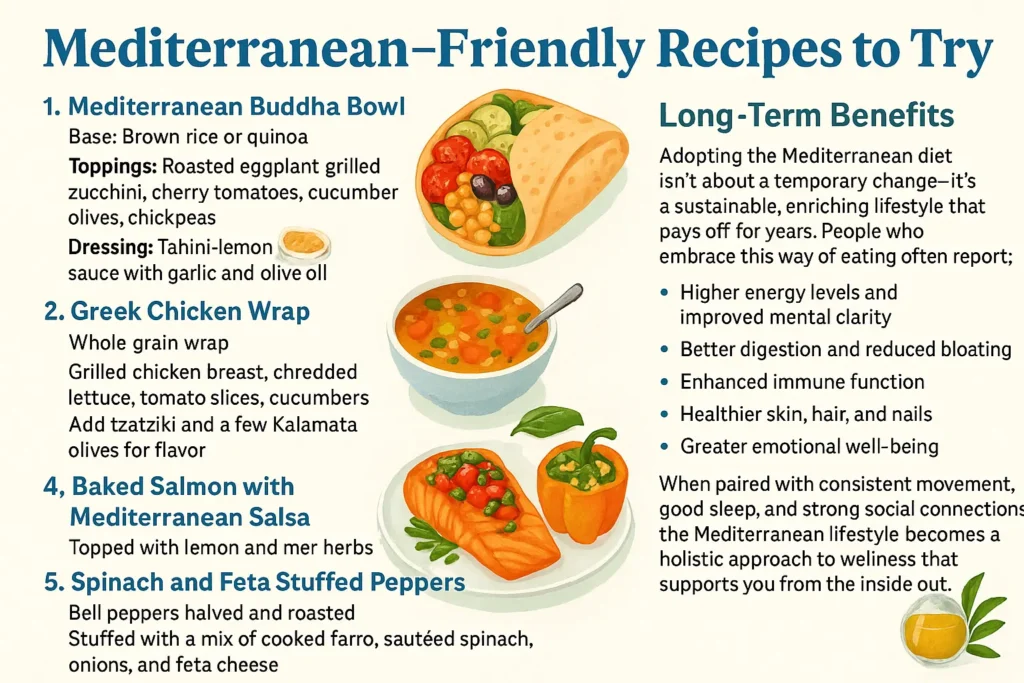
Mediterranean-Friendly Recipes to Try
1. Mediterranean Buddha Bowl
- Base: Brown rice or quinoa
- Toppings: Roasted eggplant, grilled zucchini, cherry tomatoes, cucumber, olives, chickpeas
- Dressing: Tahini-lemon sauce with garlic and olive oil
2. Greek Chicken Wrap
- Whole grain wrap
- Grilled chicken breast, shredded lettuce, tomato slices, cucumbers
- Add tzatziki and a few Kalamata olives for flavor
3. Veggie Lentil Soup
- Ingredients: Lentils, carrots, celery, garlic, diced tomatoes, onions
- Simmered in vegetable broth with rosemary, thyme, and a splash of olive oil
4. Baked Salmon with Mediterranean Salsa
- Salmon fillet baked with lemon and herbs
- Topped with chopped tomatoes, red onion, olives, parsley, and olive oil
5. Spinach and Feta Stuffed Peppers
- Bell peppers halved and roasted
- Stuffed with a mix of cooked farro, sautéed spinach, onions, and feta cheese
Long-Term Benefits
Adopting the Mediterranean diet isn’t about a temporary change, it’s a sustainable, enriching lifestyle that pays off for years. People who embrace this way of eating often report:
- Higher energy levels and improved mental clarity
- Better digestion and reduced bloating
- Enhanced immune function
- Healthier skin, hair, and nails
- Greater emotional well-being
When paired with consistent movement, good sleep, and strong social connections, the Mediterranean lifestyle becomes a holistic approach to wellness that supports you from the inside out.
Final Thoughts: Why You Should Try the Mediterranean Diet
You don’t have to overhaul your entire life in a day. Start by making one change at a time, maybe switch butter for olive oil, add a vegetable to every meal, or try out a new grain like bulgur. These small shifts add up to big results over time.
This diet is incredibly flexible, rich in flavors, and supported by decades of scientific research. Most importantly, it doesn’t feel like a diet, it feels like enjoying good food with people you love, all while taking care of your body.
If you’re ready to take the first step, create a simple meal plan, stock your kitchen with healthy staples, and consider using a tool like the Custom Keto Diet Plan to make it easier to personalize your journey.
Disclaimer: This content is for educational purposes only and is not intended as medical advice. Always speak with a healthcare provider before making significant dietary changes or starting a new eating plan.
“This post contains affiliate links, and I may earn a commission at no extra cost to you if you make a purchase through them.”
FAQs
Can I lose weight on the Mediterranean diet?
Yes, especially if you emphasize whole, unprocessed foods and stay physically active. This diet isn’t about counting calories—it’s about nourishing your body with nutrient-rich, balanced meals that leave you feeling satisfied.
Do I have to eat fish?
Fish is recommended because it provides essential omega-3 fatty acids, but if you don’t eat fish, you can still succeed by incorporating plant-based omega-3 sources like walnuts, flaxseeds, and chia seeds, or using supplements after consulting a professional.
Is wine necessary?
Wine is entirely optional. If you don’t drink alcohol, you’ll still gain full benefits by focusing on the food and lifestyle aspects.
What if I don’t have time to cook?
Focus on quick, simple recipes with few ingredients. Meal prep on Sundays or use a slow cooker to save time during busy weekdays.
Is this diet suitable for families or kids?
Absolutely! The Mediterranean diet encourages a variety of colorful, flavorful foods that appeal to all ages. You can involve kids in cooking and make meals a fun, family-focused activity.

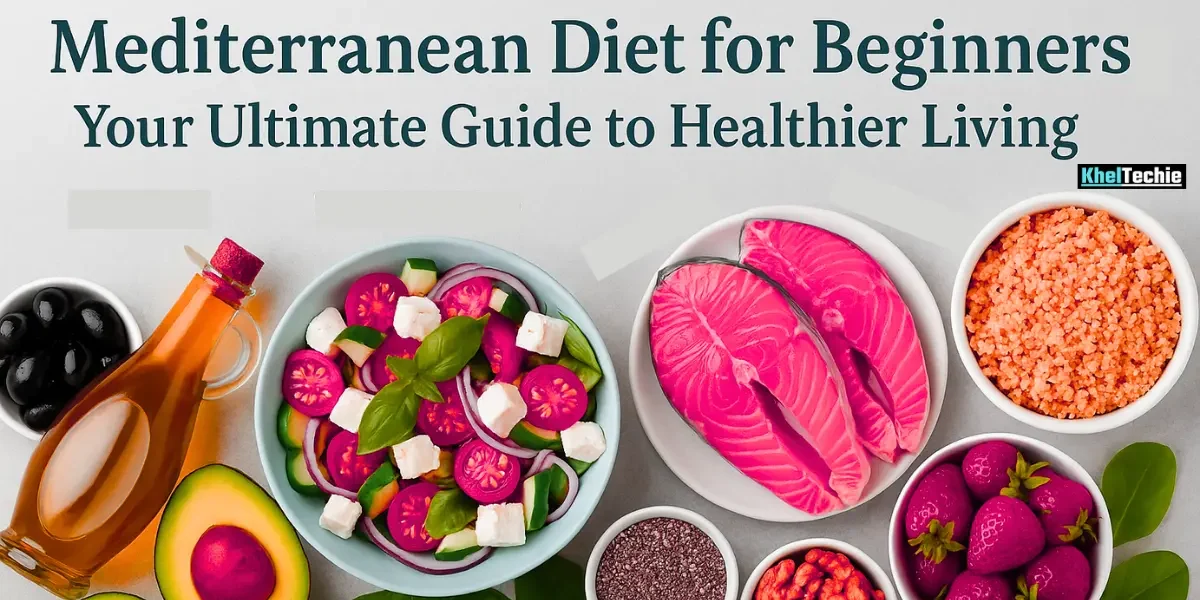
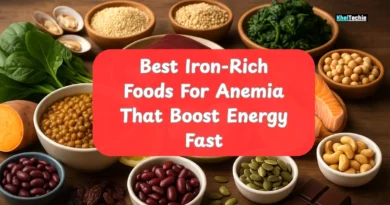
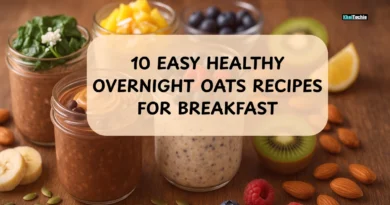

Pingback: Pilates For Beginners: Drop Fat Fast In 30 Days!
Pingback: Top 10 Natural Foods That Keep You Young : Secrets To Youth